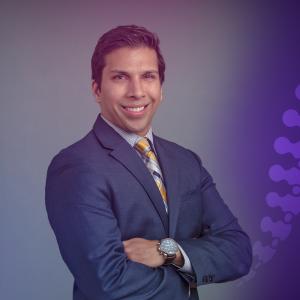Doctors at NYU Langone’s Spine Center Can Usually Help Patients with Back Pain Avoid Surgery. But Even When a Procedure Is Necessary, a Full Recovery Is the Norm.

Joined by her surgeon and fellow running enthusiast, Dr. Erich G. Anderer, Connie Allen enjoys a full recovery one year after back surgery.
Photo: Brad Trent
As a neurosurgeon who specializes in spinal cases, Erich G. Anderer, MD, has spent well over a decade mastering techniques and procedures to treat severe back pain—and avoiding them whenever possible. “My philosophy is ‘less is more,’” says Dr. Anderer, chief of neurosurgery at NYU Langone Hospital—Brooklyn and a member of NYU Langone’s Spine Center. “There are situations when we have no choice but to fix a problem in the operating room, but I work with patients to develop a treatment plan that usually doesn’t require surgery.”
Unlike most of Dr. Anderer’s patients, Connie Allen, a devoted athlete who has run four marathons, was one of those who didn’t have a choice. In 2017, the 30-year-old fitness enthusiast from Verona, New Jersey, was squatting 200 pounds at the gym when she felt something pop in her lower back. Intense pain radiated down her legs. Refusing to let the injury slow her down, Allen tried a variety of alternative therapies: acupuncture, massage, chiropractic. Nothing helped. Then, an MRI revealed the reason: a ruptured disc in her lumbar spine was compressing nearby nerves. An orthopedist recommended surgery and giving up the weights.
Allen reluctantly agreed, but then she got a reprieve. When her blood work came back, she learned she was pregnant, so surgery was off the table. Allen’s discomfort subsided, possibly due to a surge in pregnancy hormones that relaxed her back muscles, but the pain returned not long after her daughter was born. By January 2018, she was in “a really bad place,” she recalls. “I could barely lift the baby to feed her. I couldn’t sleep, couldn’t eat.”
Finally, in June 2018, on the advice of an acquaintance, she reached out to Dr. Anderer. After reviewing Allen’s previous MRI, he ordered a new one. The second scan confirmed the worst: a bulging disc that had narrowed the canal, compressing nerve roots. If the bulge expanded and completely choked off the spinal canal, it could cause severe neurological deficits, such as the loss of bowel and bladder function. “It was an extremely large herniation of the L4–L5 disc, the one most commonly injured,” explains Dr. Anderer. The success rate for disc surgery is about 90 percent, but even so, he considers it only if symptoms persist for more than 6 weeks. Because Allen was debilitated and had been in pain for more than a year, he felt she was a suitable candidate. “I told Connie that she had suffered long enough,” says Dr. Anderer.
Allen knew she needed surgery but feared it would end her active lifestyle. Dr. Anderer, an athlete himself, helped her embrace a different perspective. “Some clinicians discourage people from returning to strenuous activity following disc herniation,” he says. “My goal is not just to get patients pain-free, but back to doing all the things they did before the injury, with no limits.” Allen found Dr. Anderer’s words “extremely powerful” because “most doctors told me all the things I should never do again,” she says. “He made me feel ready for surgery.”
“My goal is not just to get patients pain-free, but back to doing all the things they did before the injury, with no limits,” says neurosurgeon Dr. Erich Anderer.
Dr. Anderer operated on Allen later that month. Using a surgical microscope to maneuver through an incision less than one inch wide, he removed the ruptured portion of her disc in under an hour. The procedure, a microdiscectomy, is one that Dr. Anderer commonly performs, and it accounts for about half of the more than 1 million back surgeries performed annually in the United States. Of the roughly 500 patients diagnosed with a herniated disc that he sees each year, fewer than 10 percent require surgery.
Because up to 20 percent of injured discs reherniate at some point, Dr. Anderer tells his patients that the best way to avoid a recurrence is to strengthen their core. “I love yoga, Pilates, meditation, and other self-care strategies because they empower the patient, even those who have had surgery,” Dr. Anderer says.
Allen went home—pain-free—the same day she had surgery. “I couldn’t walk in,” she says, “but I was able to walk out.” Dr. Anderer knew that Allen’s fitness would enable her to make a full recovery, but he cautioned her to take it slowly. Three months after surgery, she was able to resume weight lifting. “The fact that I could is just amazing,” says Allen. “I feel like I can do anything.”

